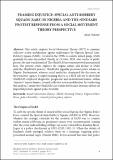Framing injustice : Special Anti-Robbery Squads (SARS) in Nigeria and the #EndSARS’ protest response from a social movement theory perspective
Abstract
This paper employs Social Movement Theory (SMT) to examine collective action mobilization against malfeasance by Nigeria’s Special Anti-Robbery Squads (SARS). Created in the 1990s to counter violent armed robberies, SARS gradually derailed and became discredited. Finally, in October 2020, after weeks of public protest, the unit was disbanded. The #EndSARS movement proved instrumental to that outcome. This article explores the origins, nature and decline of SARS until the #EndSARS protests. #EndSARS emerged as a rare instance of a social movement that provoked police reform in Nigeria. Furthermore, whereas social media has dominated the discourse on the protesters’ agency, I employ framing theory as a sub-set of SMT to show that #EndSARS employed diagnostic, prognostic and motivational frames, within “injustice” master frames, towards collective action mobilization. In conducting this analysis, I situate the #EndSARS case within the broader literature debate on impactful protests against police brutality.
Citation
Omeni , A 2022 , ' Framing injustice : Special Anti-Robbery Squads (SARS) in Nigeria and the #EndSARS’ protest response from a social movement theory perspective ' , Modern Africa , vol. 10 , no. 2 , pp. 9-32 . https://doi.org/10.26806/modafr.v10i2.409
Publication
Modern Africa
Status
Peer reviewed
ISSN
2336-3274Type
Journal article
Collections
Items in the St Andrews Research Repository are protected by copyright, with all rights reserved, unless otherwise indicated.

